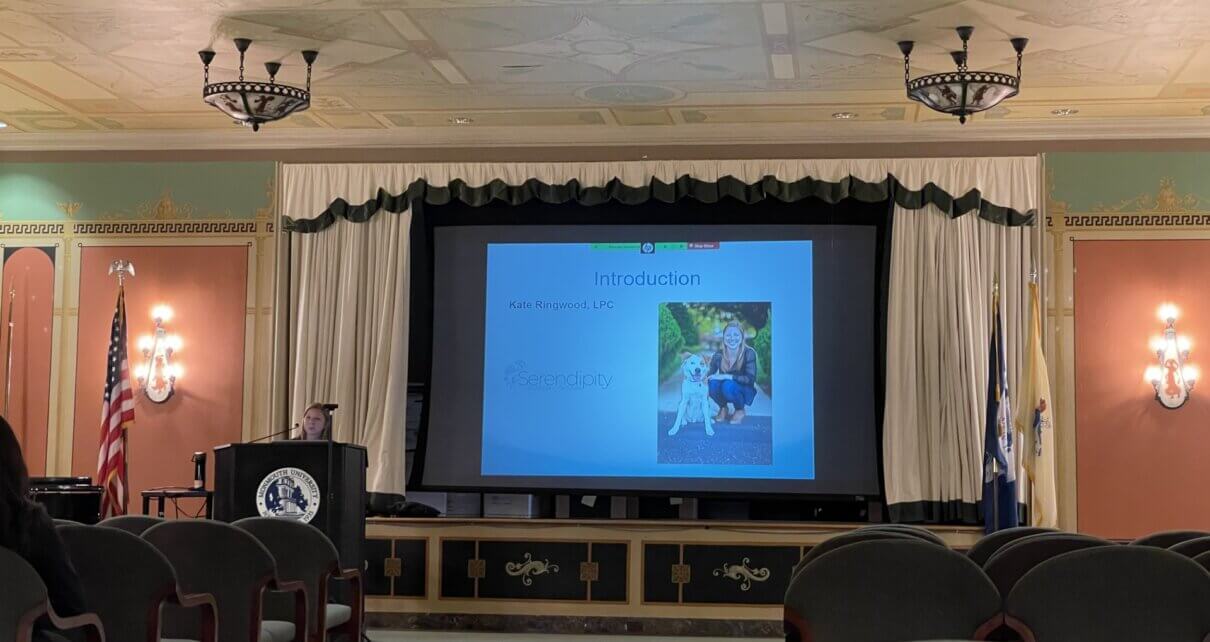Counseling and Prevention Services (CPS) held a discussion on eating and body image in the Great Hall Auditorium, led by guest speaker Kate Ringwood, LPC, on Friday, Sept. 15. The hour-long presentation, both available via Zoom and in-person, discussed signs and symptoms of disordered eating, as well as how to take the first step towards recovery.
Attended primarily by female students, the conversation was inspired by students themselves who identified body image and eating as some of their main concerns while attending college. Eric Kaighn, Assistant Director of CPS, noted that more and more individual students have come into CPS requesting to talk about body struggles.
“We’re doing our best given our limitations to just listen to [students’] needs. So this felt like it could’ve been an opportunity to start addressing that,” Kaighn said.
College students— due to the major life transition that attending college entails— are proven to have a higher prevalence of mental health disorders, with student-athletes at a higher risk than any other division of students. Their increased susceptibility includes depression, substance abuse, social anxiety, and eating disorders.
Ringwood within her presentation noted that talking about typically vulnerable subjects is the first step to healing and diminishing the stigma of mental health conversations. Jamie Goodwin-Uhler, Ph.D., Specialist Professor of Psychology and Licensed Psychologist, agreed with the sentiment.
“The more we bring these issues out in the open, the better it is for mental health,” said Goodwin-Uhler. “Many people with eating disorders have a lot of shame about their struggles, and this may prevent them from accessing help they could greatly benefit from. Having open conversations about these topics makes it feel more acceptable to acknowledge these struggles and seek out support for them. Shame thrives in secrecy; bringing things into the light is often the first step toward healing.”
Though this open discussion proved to be the first of its kind, Kaighn hopes that CPS will hold more discussions on a range of other sensitive topics in the future. “We don’t have any in the works right now,” he said, “but I do know that one of our counselors is actively working towards [a discussion regarding] children of alcoholic parents or caregivers who are using alcohol or other drugs and how that can affect students. That’s going to be a mini-workshop series for students if they’re interested.” He also mentioned that they are hoping to implement an anxiety support group in the near future. The exact details and status of this are yet to be determined by CPS.
Goodwin-Uhler provided her own suggestions on possible topics of future discussions, as well: “Future topics could include trauma and its impact on college life, and supporting neurodivergent students in their college experiences.” She also noted that she’s “thrilled that issues related to mental health are becoming both acceptable and desirable to discuss and hope[s] the trend continues.”
Ultimately, the topics of future discussions lie in the hands of the students and what they come forward with as being their greatest concerns. “The more people that come up to us and say, hey we would love to learn more about this or we would love to see more action around this, that’s how we know how to use our data,” Kaighn said. He also added that he understands the concerns of being at a medium-sized University, where the means of holding discussions are possible yet daunting due to everybody knowing each other. “That can sometimes dissuade people from feeling comfortable enough to come to a group,” he acknowledged. “We’re trying to figure out ways around that. It’s just about spreading the word.”


